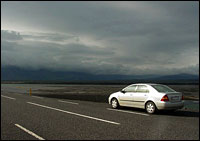A few weeks ago, Clark wrote about truck drivers slowing down to economize on fuel. It’s a great story, but was it a real trend or just anecdotal?

Well, I’m here to report that there’s some truth to it. Or at least some truthiness. A recent Congressional Budget Office paper examining the effects of gas prices found this: “Freeway motorists have adjusted to higher prices by making fewer trips and driving more slowly.”
That’s surprising to me. I mean, I don’t slow down when gas prices are high; it would never occur to me. Do other folks?
But whether it occurs to anyone or not, it is a rational response to high prices, depending on the circumstances. As the paper explains, slowing from 70 mph to 65 mph reduces a typical vehicle’s fuel consumption by 8.2 percent. That adds up eventually, but whether it’s worth it depends on how much you value your time. (It also depends on how pricey gas is, and how efficient your car is.)
So the paper crunches some additional numbers — fascinating stuff, I assure you — and finds that freeway speeds really did decline as gas prices rose. Not by much, mind you, but a little: about a teaspoon of fuel every 2.6 miles. There’s almost no way that the results are intended; it’s almost like individual irrationality adding up to collective rationality. And the paper sort of hints at that:
Such small responses are unlikely to result from conscious calculations. Few motorists would have the information required to gauge their responses so acutely, nor the time or inclination to do so. However, higher prices make drivers pay more attention to speed. The modest reductions in speed suggest that drivers may have responded by easing off slightly on the gasoline pedal or dialing back the cruise-control settings a notch. If only a minority of drivers have that response, their reduced speeds could cause nearby drivers to slow down as well, even if gasoline prices alone would not have that effect.
The upshot, I guess, is that there’s an easy way to save the planet. Just reduce your fuel use (and everyone else’s) by getting in the left lane and driving 45 miles per hour. Folks may not appreciate you at first, but you can just hand them the CBO paper and talk about elasticity of demand. They’ll come around soon enough.
Good luck!



